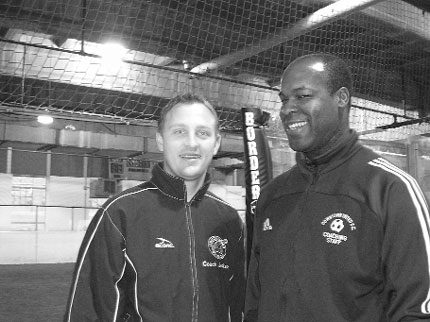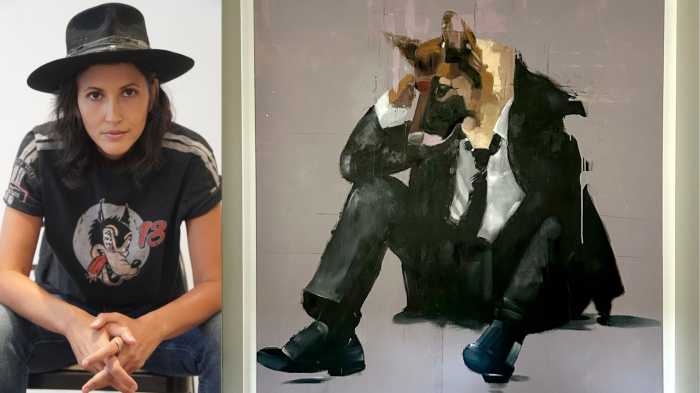By Judith Stiles
In the morning, physical therapist Jack Stefanowski works with newborns, small infants diagnosed with “delayed development.” But in the afternoon, Coach Stefanowski dons his goalie gloves and can be found demonstrating how to catch and punch a soccer ball, ironically a size five ball, which is about the same size as some of his patients. The daily transition from gentle to vigorous movement is no problem for Stefanowski.
“Many of the issues are the same for the babies and the goalies — balance, coordination, reflexes. I have learned from working with the infants that you have to be patient when it comes to children and their rate of development; and patience with aspiring goalkeepers is very important,” says Coach Stefanowski assuredly. “Every child develops differently, and often parents forget that.”
At the Downtown United Soccer Club everybody knows Jack. He is well liked and greatly respected by parents and players alike. “If you don’t get the soccer drill right away, he always takes the time to help you with it individually,” says Emma Taylor of the U-15 Girls Team. “Jack is great!”
Besides his goalkeeper training sessions at DUSC, he has become a very busy and sought-after coach. This past year he was most known for being the assistant coach to Cesar Markovic throughout their record-breaking season with the St. Peter’s College men’s soccer team. When Markovic was hired to be head coach of the Division 1 men’s team for SUNY Stonybrook, Stefanowski moved to Stonybrook also, along with assistant coach Tom Giovatto, also of DUSC, as part of Markovic’s staff.
Stefanowski sometimes finds a bit of time to play himself in the Urban Soccer League or in the coaches’ games at Pier 40, where it is unlikely that you will see him being the goalie; instead he plays any position on the field with great skill and speed.
He began playing soccer at about age 6 with his twin brother, Tomasz. Jack started out as a field player with Tomasz in goal and within a year they switched, cementing Jack’s love of being a goalie, which would carry him all the way through his years of playing for N.Y.U. (You have to wonder how long it took their coach to notice the twins had made the switch for good.)
While most soccer players have a fear of playing in goal, goalies thrive on the thrill and pressure. They tend to be fanatics about the position. Anyone who knows soccer will say that it takes a certain personality type to be a goalie. “I look for goalies who stay composed in a tense situation,” says Stefanowski. “A good goalie can adapt to severe internal stress in a positive manner. It is enormous pressure being a goalie.”
In theory, for a goal to be scored the ball has to get past 10 of a goalie’s teammates, meaning both forwards and defenders have “lost” the ball to the opponents. By this logic it is not just the goalie who gives up a goal. However, when the ball is shot at the goal, fans are holding their breath to see if the goalie will make the save. Every move a goalkeeper makes is under the spotlight, and it is this pressure that Coach Stefanowski says goalies actually enjoy. “I love shootouts,” Stefanowski adds. “It gives the goalie a chance to shine and make a big play.”
While many field players wilt at the thought of being a goalie in a shootout, goalkeepers are crazy enough to love this kind of tension, in which a series of shots are taken on the keeper to break a tie game. In a shootout there are no defenders helping, just shooter versus keeper, each shot taken from 12 feet away. Gulp.
A calm, focused goalkeeper can change into a fiery daredevil at any moment in a game when the keeper is trying to protect his turf. This fierceness you don’t see in Coach Stefanowski during casual conversation or when he is exercising the fragile little limbs of babies. But if you watch him coaching a college match or his city roughnecks on the DUSC U-19 Boys Team, you will see another side of Stefanowski, a coach with an explosive passion for the game.
With the babies all the way up to the big boys, Stefanowski has a gift for developing quicker reflexes, body strength and coordination. He communicates with a rare grace and acuity. Although this man wears the two hats every day, that of baby physical therapist and goalie coach, he cleverly manages to capitalize on the common themes found in both professions, so that babies will no longer suffer “delayed development” and the goalies can develop without delay.
Read More: https://www.amny.com/news/







































